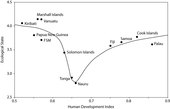Highlight
Coral Reef Decline and Human Well-Being in the Pacific Islands
Achievement/Results
Two years ago, IGERT students (Schultz, Kittinger, Prescott and Fa’anunu) and faculty (Wilcox, Kapan, Toonen) organized an international symposium to explore the relationship between the health of coral reef ecosystems and the well-being of Pacific Islanders who are dependent upon these ecosystems for goods and services. Collaborating with international experts in the diverse fields of public health, marine ecology, fisheries science, sociology and economics, this group has made a key discovery. With initial improvements in human development, the health of coral reef ecosystems declines gradually until a threshold is reached. At this tipping point, the degradation of coral reefs is rapid and severe, eliciting a conservation response from human societies, usually in the form of marine protected areas. While such measures are effective in reversing the downward trend in ecosystem health, they do not result in complete recovery. The observed trend is commonly seen in coral reef aquarium microcosms and may represent a universal response to stress of these sensitive and complex ecosystems.
Our findings have wide implications: the cost of human development in the Pacific Islands is coral reef degradation. Societies are not willing to forego higher standards of living for healthier ecosystems, and there is likely some acceptance of ecological decline. Our results will be submitted for publication in Science.
Address Goals
First, this research achievement required an exceptional level of integration of knowledge, methods and data spanning the natural and social sciences to address an extremely important environmental problem (global degradation of coral reef ecosystems) and a regionally important public health challenge (health disparities in the Pacific Islands). The research entailed what European scientists call transdisciplinary research. Our nation has lagged behind European nations in this research approach. So this project demonstrates American science can perform transdisciplinary research at a high level.
Second, the students and faculty involved in this project came from a broad range of disciplines and worked with international partners in the Asia-Pacific region. The research team has begun doing a substantial amount of public outreach outside the university describing this and related research results from our IGERT project’s marine ecosystem health research cluster.







